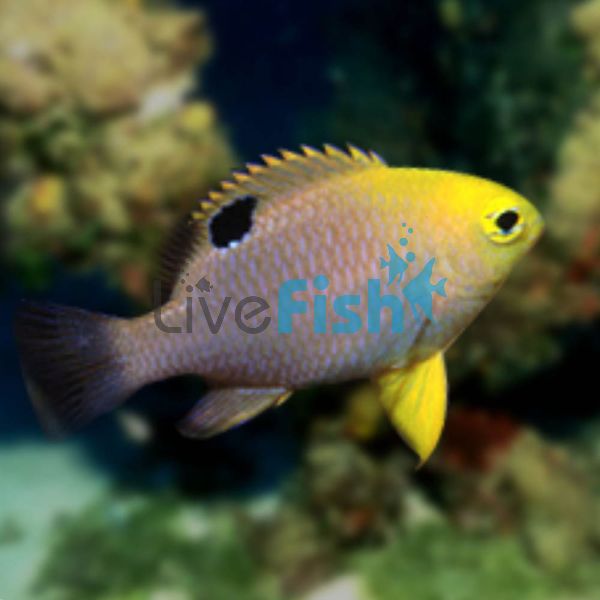Talbot's Damselfish - Medium
These colourful, active little fish have one of the most peaceful temperaments of all Damsel Fish. This makes them an interesting and rewarding choice for beginner aquarists.
- Buy 4 for $29.45 each and save 10%
Talbot's Damselfish come in a range of pink to dark purple body colouring with a distinctive painted yellow face. To confuse predators they have a black eyespot located near the base of its dorsal fin which helps it to avoid attacks from the front. Although quite small in size, it is a very active swimmer and will eat almost anything you offer it.
There are no known differences between males and females, but the males are generally thought to be the larger sex. It is quite difficult to breed this species in captivity. This is due to the complications of rearing the larvae and raising the smaller juveniles. It has been done, but care must be taken only to attempt this in a large dedicated tank without predators.
Talbot's Damselfish are the least aggressive type of damsel and will spend their time in the lower areas of your aquarium. They will rarely get territorial as long as tank requirements are met making these fish a great addition to any reef tank.
These fish are originally from the Western Pacific region from Fiji all the way to the Andaman Sea. They are also found dotted around Australia and the Great Barrier Reef. Inhabiting deep reef areas as well as shallower water such as bays and lagoons. They will hover around all areas with plenty of coral growth and sometimes even close to the bottom substrate at depths of up to 35 metres.
Tank Recommendations for Talbot's Damselfish
The smallest tank size required for this species of Damselfish is 75 litres. They will need you to provide plenty of areas for them to hide such as crevices and caves which can be created with coral and live rock. A sand substrate is also an excellent choice as this will allow them to bury themselves if needed when they feel threatened. This species will enjoy aquarium setups with any kind of lighting or water movement.
Suitable Tank Buddies
Talbot's Damselfish will be bullied by more aggressive species and will get along much better with passive and peaceful fish. Predatory fish will almost certainly prey on your damsel but these fish do extremely well in a reef environment and will leave your live coral and invertebrates well alone.
Usually Compatible
It's extremely easy to keep Talbot's Damselfish together as a pair and even as a small group as long as more tank space is added for each fish. They will do well with more docile species such as Boxfish, Blennies and Dragonets. Both large and small Angelfish can also be kept successfully together. Crustaceans, Gobies, and Parrotfish would make a wonderful choice too.
Sometime Compatible
Batfish, Butterflyfish and Cardinalfish may bully the damsel from time to time so keep an eye out for that if housing with these species. Other species of Damsels and Fancy Damsels sometimes can be problematic due to territory disputes. They may also get picked on a little by Triggerfish, Grunts and Filefish.
Rarely Compatible
Larger predatory fish such as Eels, Sharks and Groupers will most certainly eat your Damselfish so avoid keeping these together. Scorpionfish and Snappers will also be a problem. The damselfish will outcompete docile fish such as Pipefish and Seahorses for food and cause them to starve.
Feeding Your Talbot's Damselfish
These fish are omnivorous and in the wild will feed primarily on zooplankton. They will also occasionally eat vegetable matter such as algae and as such need a wide variety of foods when kept in captivity. They will love all kinds of meaty food such as shrimp, minced fish and varied types of omnivore pre-preparations. This can be given as frozen, fresh and flake but a great option is sinking pellets. These will sink to the bottom of the tank where the damsels like to stay and provide easy access and less competition. Blanched vegetables and herbivore preparations should also be given to make around 50% of their dietary intake. Feeding them smaller amounts several times a day is best.
| Scientific Name | Chrysiptera Talboti |
|---|---|
| Care Level | Easy |
| Common Names | Talbot's Damselfish is also known as Talbot's Demoiselle |
| Diet | Omnivore |
| Fish Family | Pomacentridae |
| Lifespan (years) | 15 |
| Max. Length (cm) | 6.5 |
| Min. Tank Volume (l) | 75 |
| Origin | Indo-Pacific |
| Reef Safe | Yes |
| Sociability | Semi-aggressive |
| Venomous | No |
| Water Conditions | 23.3-28.9° C, dKH 8-12, pH 8.1-8.4, sg 1.020-1.025 |




